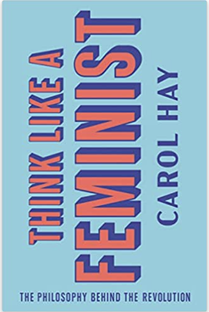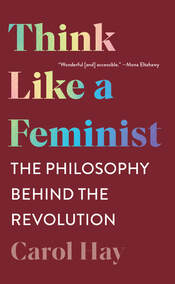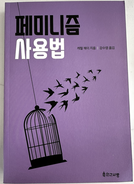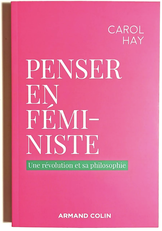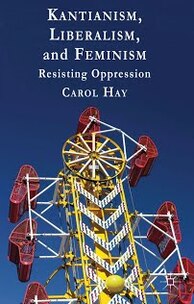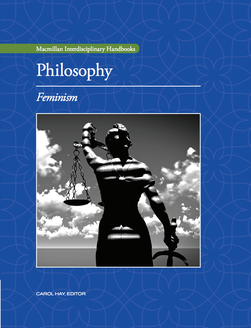|
|
"With a winning mix of scholarship and irreverence, the author lays out the philosophical underpinnings of feminism. ... A lively compendium of what Gloria Steinem didn’t tell you about feminist ideas and why they matter." - Kirkus Reviews
"Hay succeeds in clarifying abstract—and often sobering—concepts with straightforward terminology and a dash of irreverent humor. This crisp, well-informed primer on feminist theory will resonate with young women and experienced activists alike." - Publishers Weekly "This smart, accessible primer will appeal to lifelong feminists as well as to those less familiar with the principles and history of feminism." - Booklist "Readable, illuminating, ... wry and tongue-in-cheek, and ... understandable even to skeptical legions. ... Hay entertains throughout in a thought-provoking, unforced manner." - Hindustan Times |
"With this book, beautifully written and often disarmingly hilarious, we see clearly the luminous future for feminism, and one of its brightest lights will be Carol Hay." - Clancy Martin, professor of philosophy, University of Missouri–Kansas City
"At once welcoming and inclusive, yet uncompromisingly political, Carol Hay recognizes the wide variety of feminist voices while speaking boldly in a voice of her own." - Quill R. Kukla, professor of philosophy, Georgetown University "Think Like a Feminist has opened my eyes in ways I had not known they were closed. It is a timely and deeply important book, and I cannot recommend it highly enough, especially for those who yearn for justice for all human beings, no matter their sex, gender, or race." - Andre Dubus III |
"The best feminist work leaves you changed, unable to look at the world in the same way. Think Like a Feminist does this. Carol Hay provides historical perspective, political awareness, and philosophical insight to cut through confusions about feminism, giving us the tools of analysis and skills of engagement needed to build a more just world." - Sally Haslanger, Ford Professor of Philosophy & Women’s & Gender Studies, MIT
"Carol Hay is a warm and witty guide through modern-day gender politics, welcoming novices and offering substance to those already with her in the trenches. This is the book to give the questioning young person or the cynical patriarch in your life, but also a good read for your feminist book club or radical action group." - Alice MacLachlan, editor, Feminist Philosophy Quarterly "A timely and accessible introduction to feminist thought in the twenty-first century. Highly recommended." - Ásta, author of Categories We Live By: The Construction of Sex, Gender, Race, & Other Social Categories |
|
|
"Progressives concerned about gender domination and other kinds of social oppression have traditionally viewed liberalism with a jaundiced eye—not at all the solution, but very much part of the problem. In this spirited contrarian text, Carol Hay makes a bold and lucid case for the defense. She argues that despite liberalism's historic complicity with patriarchy and Kantianism's abstraction and hyper-rationalism, Kant's crucial concept of duties to oneself can indeed be turned to emancipatory ends, thereby redeeming deontological liberalism for a radical feminist agenda. If mainstream liberals uninterested in social oppression issues and non-mainstream progressives uninterested in liberalism want to have their unthinking presuppositions challenged (and even if they don't), they both need to read this provocative book." – Charles W. Mills, John Evans Professor of Moral and Intellectual Philosophy, Northwestern University
"In the most sustained analysis of a duty to resist oppression to date, Hay defends a Kantian account of a duty of self-respect on the part of the oppressed to resist their own oppression. Intriguing and challenging cases motivate the deep issues presented, followed by detailed analyses and fair and open-minded presentation of all sides of the debates. This clear and engaging book is a must-read by anyone interested in oppression, moral psychology, and feminism." – Anita Superson, University of Kentucky |
"These are fun and inspiring times to be a Kantian philosopher! Carol Hay's new addition to Kantian scholarship proves the point. Hay's ability to identify and engage central philosophical issues at the core of any plausible account of oppression makes it a very interesting contribution to the growing scholarship on systemic justice in general as well as to the related Kantian and feminist scholarship in particular. I suspect we will be hearing much more from her in the years to come – undoubtedly a good thing."
– Helga Varden, Notre Dame Philosophical Review "Beginning in the preface, the reader is made aware that liberalism, which includes Kantianism, is being philosophically defended against contemporary radical, communitarian, and identity-political critiques and programs that tend to dismiss or attack liberalism (and Kantianism) as ineffective or malign for liberatory projects of race, gender, and other sites of oppression. Hay’s theses and arguments build, chapter by chapter, with passion, circumspection, and conscientious citation of related scholarly work. … Overall, Hay’s Kantianism, Liberalism, & Feminism is a well-executed update of Kantian liberalism for feminism. It is suitable for Kant scholars, feminist moral theorists, and advanced college readers and should serve as a valuable contribution to ongoing discussion for all members of these audiences - Naomi Zack, Radical Philosophy Review |
"Carol Hay's account of Kantian liberal feminism is at once reconciliatory and revisionary. ... Hay's interest is practical: bringing new resources to bear on problems worth solving. She confidently challenges the tendency to dismiss ideas due to the problematic commitments of their earlier adherents, and seeks to build what she can from those ideas. She succeeds in showing that a suitably modified Kantianism can be deployed in feminist theorizing, and that liberal principles have a life beyond the privileged interests of those who once applied them narrowly, and to such socially destructive ends. ... Hay has made a significant contribution to not one but two literatures, and will, I believe, influence the way we think about resistance going forward." - Daniel Silvermint, Hypatia: A Journal of Feminist Philosophy
"Is Kantian feminism an oxymoron? Carol Hay’s Kantianism, Liberalism, & Feminism: Resisting Oppression shows that it does not have to be. Hay persuasively argues that feminism and Kantianism can influence each other dialectically and formulate an imperfect duty, out of self-respect, to resist sexual harassment in particular and sexist oppression in general." - Dilek Huseyinzadegan, Kantian Review |
|
cover photo by Wondra
|
A new, annotated reader, The Philosophy of Love and Sex presents not only classic readings on love and sex from a diverse selection of philosophical perspectives, but also groundbreaking work in this rapidly changing field. Unlike existing readers, this comprehensive reader takes an interdisciplinary approach, choosing to include the voices of philosophers and philosophically minded thinkers from many different traditions, emphasizing not only the core writers who have defined the tradition, such as Plato and Stendhal, but work as recent as 2015 from feminists, transgendered persons, and others.
|
|
PART ONE: LOVE
I. What is Love? 1. Thomas Merton, “Love and Need: Is Love a Package or a Message?” 2. Plato, Symposium (selections) 3. Stendhal, “Love as Crystallization” 4. Irving Singer, “Appraisal and Bestowal” 5. Mandy Len Catron, “To Fall in Love with Anyone, Do This” 6. Robert Nozick, “Love's Bond” 7. Edith Gwendolyn Nally, “The Case for Platonic Love 8. Raja Rosenhagen, “Iris Murdoch on Love as Just Attention” 9. Simon May, “Love as Perfect Friendship: Aristotle” 10. Clancy Martin, Love & Lies (selections) 11. Pope Francis, “Amoris Laetitia” (“The Joy of Love”) |
II. The Moral & Political Implications of Love: Marriage & Family 12. Emma Goldman, “Marriage and Love” 13. Mary Lyndon Shanley, “Marital Slavery and Friendship: John Stuart Mill's The Subjection of Women” 14. James Conlon, “Why Lovers Can't be Friends” 15. Carole Pateman, “Feminism and the Marriage Contract” 16. Elizabeth Brake, “Minimal Marriage: What Political Liberalism Implies for Marriage Law” 17. Claudia Card, “Against Marriage and Motherhood” 18. Charles Mills, “Do Black Men have a Moral Duty to Marry Black Women?” 19. John Corvino, “Man on Man, Man on Dog, or Whatever the Case May Be” 20. Elizabeth Emens, “Monogamy's Law: Compulsory Monogamy and Polyamorous Existence” 21. Charlotte Witt, “A Critique of the Bionormative Concept of the Family” 22. Jane English, “What Do Grown Children Owe Their Parents?” |
PART TWO: SEX
I. What is Sex? 23. Greta Christina, “Are We Having Sex Now, or What?” 24. Alan Goldman, “Plain Sex” 25. Augustine, Confessions and On Christian Doctrine (selections) 26. Michel Foucault, The History of Sexuality (selections) 27. Gloria Anzaldua, “La Conciencia de la Mestiza: Towards a New Consciousness” 28. Talia Mae Bettcher, “When Selves Have Sex: What the Phenomenology of Trans Sexuality Can Teach Us About Sexual Orientation” 29. Elizabeth Grosz, “Refiguring Lesbian Desire” |
II. The Moral and Political Implications of Sex Mortal Bodies: Discussions of Sex, Consent, & Violence 30. Vera Bergelson, “The Meaning of Consent” 31. Robin West, “The Harms of Consensual Sex” 32. Ann J. Cahill, “Feminist Theories of Rape: Sex or Violence?” 33. Bonnie Mann, “Creepers, Flirts, Heroes and Allies: Four Theses on Men and Sexual Harassment” 34. Evangelia Papadaki, “Sexual Objectification: From Kant to Contemporary Feminism” 35. Carol Hay, “The Obligation to Resist Oppression” 36. Jordan Pascoe, “Kant and Kinky Sex” 37. Sandra Lee Bartky, “Feminine Masochism and the Politics of Personal Transformation” |
Bodies for Sale: Pornography & Sex Work 38. Debra Satz, “Markets in Women's Sexual Labor” 39. Martha Nussbaum, “ 'Whether From Reason Or Prejudice”': Taking Money For Bodily Services” 40. Lori Watson, “Why Sex Work Isn't Work” 41. Catharine MacKinnon, “Pornography, Civil Rights, and Speech” 42. Gloria Steinem, “Erotica and Pornography: A Clear and Present Difference” 43. Nancy Bauer, “Pornutopia” |
Non-normative Bodies: Discussions of Race, LGBTQ, & Disability 44. Kimberlé Crenshaw, “Beyond Racism and Misogyny: Black Feminism and 2 Live Crew” 45. bell hooks, “Reflections on Race and Sex” 46. Judith Butler, “Doing Justice to Someone: Sex Reassignment and Allegories of Transsexuality” 47. Ivan Coyote, “Fear and Loathing in Public Bathrooms, or How I Learned to Hold My Pee” 48. Tobin Siebers, “A Sexual Culture for Disabled People” 49. Jennifer Bartlett, “Longing for the Male Gaze” |
|
|
Philosophy: Feminism is a textbook composed of sixteen chapters covering such topics as human nature, intersectionality, sexism and oppression, LGBTQ theory, ecofeminism, and power. The use of film, literature, art, case studies, and other disciplines or situations/events provide illustrations of human experiences which work as gateways to questions philosophers try to address.
|
"Those who teach feminist philosophy to undergraduates will find Philosophy: Feminism a welcome addition to the options for a course textbook. Offering introductory yet comprehensive explanations of a wide range of topics comprising feminist philosophy, this text serves its purpose well." - Jo Trigilio, Hypatia: A Journal of Feminist Philosophy
|
|
PART ONE: A HISTORICAL INTRODUCTION
PART TWO: CENTRAL THEORETICAL CONCEPTS OF FEMINIST PHILOSOPHY
|
PART THREE: SUBFIELDS OF FEMINIST PHILOSOPHY
|
|
